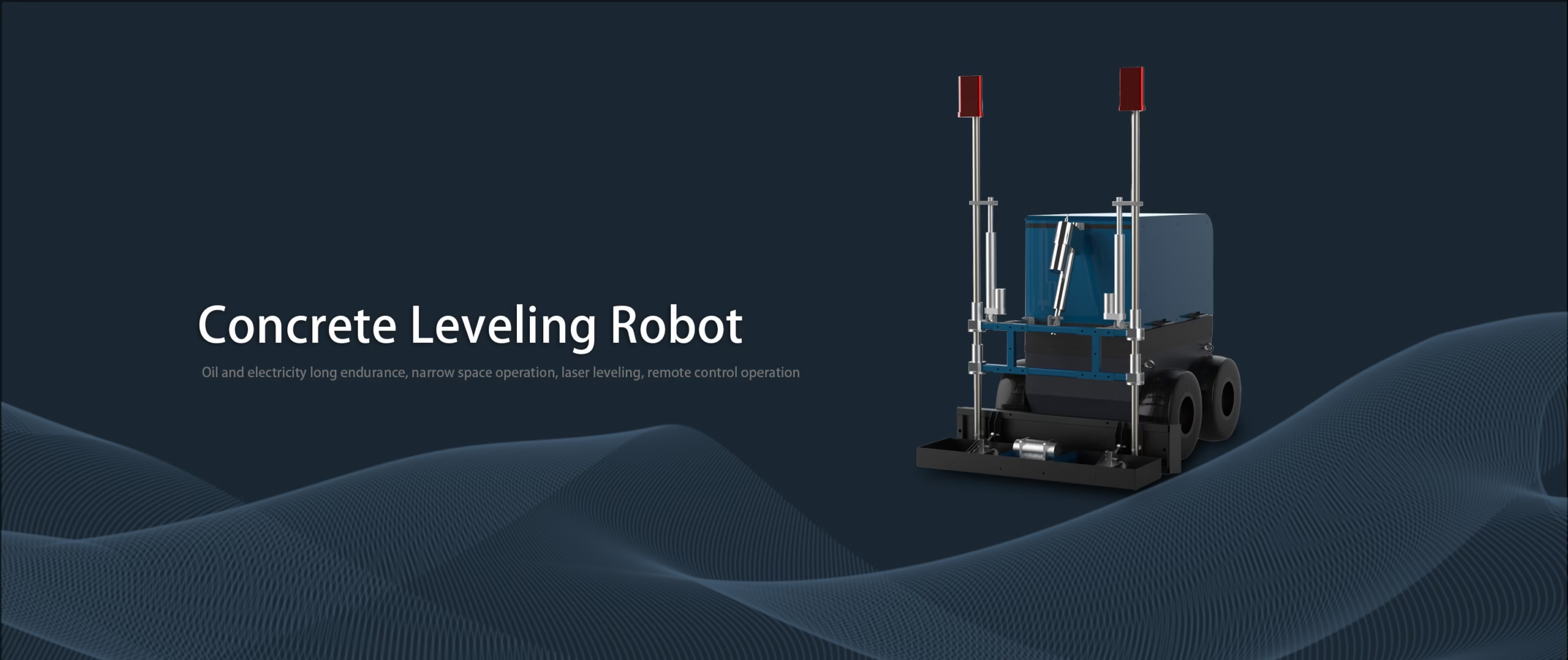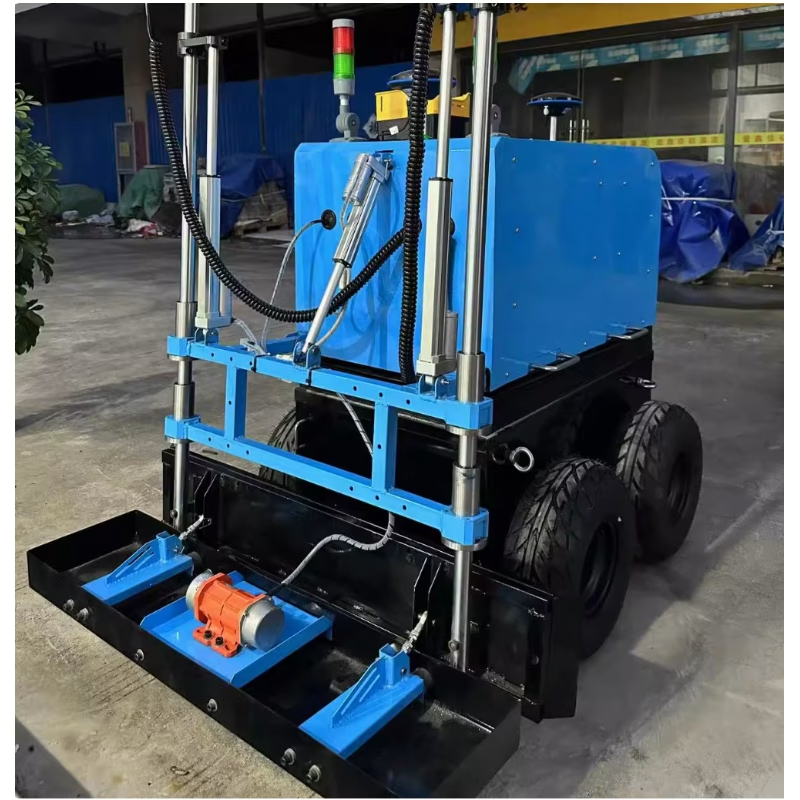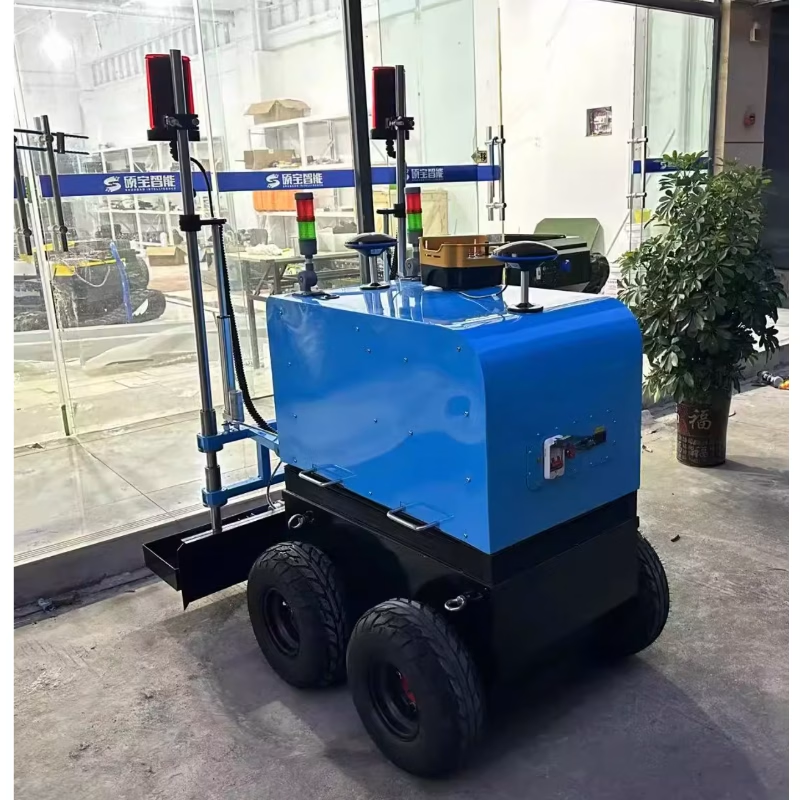Remote Control Concrete Laser Screed Robot

Remote Control Concrete Laser Screed Robot Product Introduction
- Product Overview
The remote control concrete laser screed robot is an advanced construction machinery designed to revolutionize the concrete leveling process. By integrating state-of-the-art laser technology, intelligent control systems, and robust mechanical structures, this robot offers a highly efficient, accurate, and reliable solution for various construction projects.
- Working Principle
Laser Guided Leveling
The heart of the system is the laser control system. A laser transmitter is set up at a fixed point on the construction site, which emits a rotating laser beam, creating a precise horizontal reference plane. The laser receiver, mounted on the robot, continuously monitors the laser signal. As the robot moves across the concrete surface, the control system compares the received laser data with the pre-set elevation values. Based on this comparison, it automatically adjusts the height of the screed blade in real-time, ensuring that the concrete surface is leveled to the desired accuracy.
Automated Movement and Operation
Equipped with a powerful drive system, the robot can move autonomously across the construction area. The four-wheel drive design, combined with a high-torque hydraulic motor, enables smooth movement even in concrete of different depths. The articulated design provides excellent maneuverability, allowing the robot to navigate around obstacles and corners with ease. The remote control feature allows operators to control the robot’s speed, direction, and operation from a safe distance, enhancing both safety and efficiency.
- Key Advantages
High Precision
With an accuracy of up to ±1mm, the laser control system ensures a consistently flat and level concrete surface. This high precision reduces the need for manual touch-ups and rework, resulting in a better-quality finish and long-term durability of the concrete structure.
Increased Efficiency
The robot can cover a large area in a short time. With a working efficiency of 200 – 500 square meters per hour, it significantly outperforms traditional manual leveling methods. This increased productivity helps to shorten project schedules and reduce overall construction costs.
Reduced Labor Requirements
By automating the leveling process, the need for a large number of manual laborers is minimized. One operator can easily control the robot, reducing labor costs and potential human errors associated with manual operation.
Safe Operation
In dangerous construction conditions, such as working on high floors or in areas with difficult access, the remote control function provides a safe alternative. Operators can control the robot from a safe distance, protecting themselves from potential hazards.
Adaptability
The robot is suitable for a wide range of construction projects, including large commercial buildings, industrial floors, warehouses, and even residential projects. Its ability to work on various types of concrete, including those with different consistencies and aggregate sizes, makes it a versatile tool for any construction site.
- Technical Specifications
- Drive System:excellent traction and mobility. The machine can move forward, backward, and turn with agility, with a speed range of 0-1m/s (adjustable).
- Remote Control Range: The remote control has a range of up to 400meters, allowing for flexible operation from a safe distance.
- Dimensions and Weight: Compact design for easy transportation and maneuverability on-site, with dimensions of 1380 x 1070 x 1630mm and a weight of 100kg.
- Application Scenarios
Commercial Buildings
Ideal for leveling large areas in shopping malls, office buildings, and hotels. The high precision and efficiency ensure a smooth and professional finish for floors that will be subjected to heavy foot traffic and various types of furniture and equipment.
Industrial Floors
In factories, warehouses, and manufacturing plants, where flat and durable floors are crucial for the operation of heavy machinery and the movement of goods, the remote control concrete laser screed robot provides the necessary accuracy and strength.
Infrastructure Projects
For projects such as airport runways, parking lots, and industrial parks, the robot can handle large-scale concrete leveling tasks, meeting the strict requirements for surface flatness and load-bearing capacity.
Residential Construction
Even in smaller residential projects, the robot can be used to level basements, driveways, and patios, providing homeowners with a high-quality and long-lasting concrete surface.
- Customer Testimonials
Customer A, a construction project manager, said: “Since we started using the remote control concrete laser screed robot, our project efficiency has skyrocketed. We can complete concrete leveling jobs in a fraction of the time it used to take, and the quality is outstanding. It has truly been a game-changer for our company.”
Customer B, an owner of a construction company, commented: “The robot is not only easy to operate but also very reliable. It has reduced our labor costs significantly, and the remote control feature has made our jobsite safer. We are extremely satisfied with this investment.”
- Conclusion
The remote control concrete laser screed robot represents the future of concrete leveling in the construction industry. Its advanced technology, high precision, and efficient operation make it an essential tool for any construction project. By choosing this robot, construction companies can improve productivity, reduce costs, and deliver high-quality projects with ease.
Comparison Criteria | Traditional Concrete Leveling Machines | Remote Control Laser Concrete Leveling Robots |
Work Efficiency | Covers 30 – 50 square meters per hour | Covers 200 – 500 square meters per hour, 4 – 10 times more efficient |
Operation Method | Manual operation; requires physical effort from operators | Remote – controlled; operators can manage from a safe distance |
Construction Precision | Precision around ±5 – 10 mm; highly dependent on operator skills | Precision up to ±1 mm; ensured by laser – guided control system |
Manpower Requirement | Needs 3 – 5 workers for operation and coordination | Only 1 – 2 operators needed for monitoring and remote control |
Continuity of Work | Prone to interruptions due to worker fatigue and breaks | Can work continuously for extended periods without breaks |
Adaptability to Complex Environments | Struggles in uneven terrains or areas with obstacles | High adaptability; can navigate around obstacles autonomously |
Cost – effectiveness | Higher labor costs; potential for rework due to lower precision | Lower labor costs; reduced rework, saving time and overall costs |
Technological Features | Basic mechanical structure; limited automation | Integrated with advanced laser technology, AI – assisted control, and hydraulic systems |
Get Started Today
Contact our team to schedule a consultation, and let us design the perfect robot for your fields.


